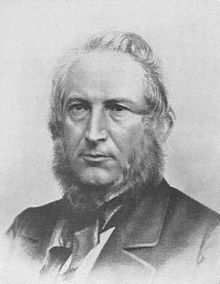Henry Philip Tappan
| Henry Philip Tappan | |
|---|---|
 |
|
| Born | April 18, 1805 Rhinebeck (village), New York |
| Died | November 15, 1881 (aged 76) Vevey, Switzerland |
| Nationality | US |
| Title | 1st President of the University of Michigan |
| Predecessor | office abolished in 1821, previously held by John Monteith |
| Successor | Erastus Otis Haven |
| Spouse(s) | Julia Livingston |
| Children | John L. Tappan |
Henry Philip Tappan (April 18, 1805 – November 15, 1881) was an American philosopher, educator and academic administrator. He is officially considered the first president of the University of Michigan.
A pioneer in the transformation of American university curricula, he was instrumental in fashioning the University of Michigan as a prototype for American research universities, and has been called the "John the Baptist of the age of the American university." His academic career was ultimately cut short by personality clashes with the university's Board of Regents, and he finished his life in self-imposed exile in Europe.
Henry Philip Tappan was born on April 18, 1805 in the village of Rhinebeck (village), New York. His father was of Prussian descent and his mother of Dutch descent. He attended Union College and studied under its president, Eliphalet Nott, graduating with Phi Beta Kappa honors in 1825. He graduated from Auburn Theological Seminary two years later and planned a career in ministry. He became associate pastor at the Dutch Reformed church in Schenectady, New York for one year, and was then pastor at the Congregational church in Pittsfield, Massachusetts. He married Julia Livingston on April 7, 1828.
A throat affliction prompted him to leave for a trip to the West Indies, and upon his return he joined the faculty of the University of the City of New York (now NYU) as a professor of philosophy.
...
Wikipedia
